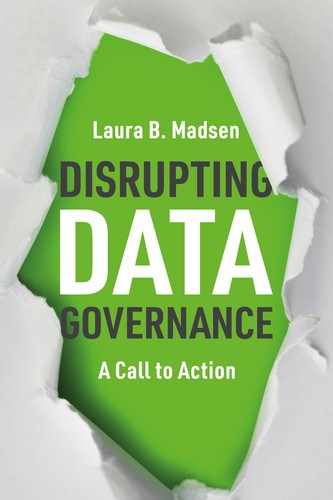Acknowledgments
Of all of the tasks that I have done in the data industry, data governance has honestly been my least favorite. Back in college – 1994, to be exact – the time came for me to declare a major. I had already been in college for a couple of years, but I took a break to see if I was interested in managing a clothing store (spoiler: I wasn’t). It was technically my junior year and I was undeclared. Finally, they told me I had to pick a major, so I chose to major in one of the hardest classes I took: psychology. I had absolutely no interest in therapy or becoming a psychologist, but under the gun, I picked psychology because I remembered how difficult the final exam was. I guess I have a pattern of picking things that I find challenging and then I attempt to break them apart into tiny pieces so that I can understand them better. That same inclination led me to write this book on data governance. I just had to tackle one of the most difficult, multi-faceted and convoluted functions in data programs because it is without a doubt the thing that is stopping us from harvesting great insights from our data.
I have a lot of people to thank for this book because it took a lot of research and discussions. I interviewed friends and friends of friends and total strangers. I read and re-read books and articles all in the name of trying to find a better way forward. I’m proud of the result but it wouldn’t be much without this list of stellar professionals (listed in alphabetical order by last name) who were willing to share their time and talents with me:
- Chris Bergh
- Kevin Burns
- Will Davis
- Donna Fernandez
- Juliet Fox
- Evan Francen
- Claudia Imhoff
- Steve Johnson
- Jason Meszaros
- Tom Moore
- Kiran Mysore
- Dan Olson
- Neil Raden
- Serena Roberts
- Nathan Salmon
- Jada Sheetz
- Margaret Todora
- Joe Warbington
To my “street team”, those people that read early versions and gave me feedback and helped me with marketing messages:
- Serena Roberts
- Karl Madsen
- Erik van der Velde
There were a million other casual conversations that I had with people, and a few that were completely “off the record.” If you’re reading this, I thank you for taking the time and for your trust in me. Finally, a posthumous note of gratitude to the incomparable David Hussman; we never talked about data governance, but he shaped these pages as if we had. David taught me a lot about agile, about leadership, and about priorities.
Just about anything to do with data, data programs, analytics or the trendy “AI” are hot topics. Organizations are desperately trying to use their data as a differentiator, but few actually achieve that level of maturity. Many of the barriers we place in our way are of our own making. From under-staffing to the politics of who owns the programs. But most impactful is the idea that the data is “wrong” or can’t be trusted. Data “as-is” in our systems reflect back what is happening. The data is not right or wrong, it’s just data. If you can be open to the idea that it is telling you something – alerting you to some misaligned process or bad context – then you’re on your way to the analytics maturity that organizations need to successfully use the data. The one thing I’ve learned through this journey, data governance is the flip side of data democratization. You can’t have one without the other.
